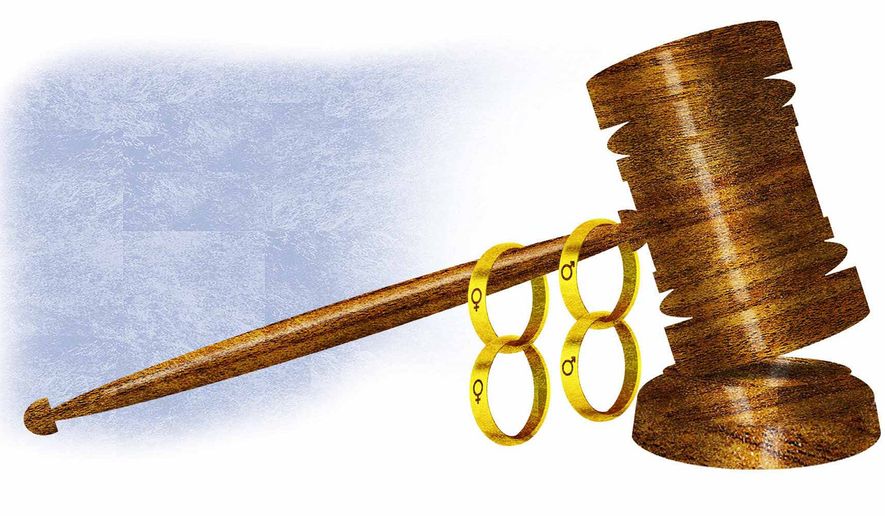OPINION:
Just moments after the Supreme Court decision overturning Roe v. Wade was released, LBGTQ and progressive activists turned their attention to the fate of gay marriage. With abortion rights now returned to the states, what would become of other substantive due process rights, like gay marriage?
They seemed to find the answer they feared in a concurring opinion penned by Justice Clarence Thomas.
“[I]n future cases, we should reconsider all of this Court’s substantive due process precedents, including Griswold (contraception), Lawrence (sodomy laws), and Obergefell (same-sex marriage),” Thomas wrote. The alarm bells sounded.
Gay marriage is far from doomed. First, no other justice sitting on the court — even those voting to overturn Roe, signed on to Justice Thomas’ concurrence. The fact that Justice Thomas was a lone wolf on this point speaks volumes.
Second, all Dobbs did was return the issue of abortion to the states. So, even if Thomas’ reasoning were to somehow become the law of the land, all it means is that marriage would become a state issue, once again. But is that wrong?
In a constitutional republic, the people, not nine unelected political appointees, must have the power to answer critical cultural questions, like abortion and gay marriage. When unelected officials have the power to set a nation’s moral compass, you have what Thomas Jefferson described as a “despotism of an oligarchy.”
In fact, one of the reasons this nation is so bitterly divided is that key cultural issues have not been debated and resolved; they have been imposed but edict. Abortion, pornography, gay marriage, school prayer and contraception were all resolved by a judicial consensus, not a national one.
When the courts enters into the fray, they make it incredibly difficult (not impossible) to correct the error. We see it today with Dobbs and when saw it in the 1950s with Brown v. Board of Education. That means these deep-seated debates are never truly resolved, but simmer in the public area for decades.
Moreover, it gave lawmakers a pass. But Dobbs is going to change that.
This decision now places the burden on our elected lawmakers to represent the values of their constituents. Gone are the days where lawmakers get to flap their gums, pretend they are working, and punt controversial cultural issues to the court. Now, they must put their money where their mouth is.
President Biden started to do that today, when he called for Congress to codify the rights that the court created in Roe. In making his proclamation, as well as declaring that Roe is on the ballot this November, Mr. Biden blamed former President Donald Trump and his judicial appointments for the decision. He left out his fair share of the blame.
Mr. Biden and Democrats always knew that Roe could be overturned, and they did nothing. When former President Barack Obama and Mr. Biden first set up shop in the White House, they had solid Democrat majorities in both chambers, and they did nothing. They could have codified Roe and passed marriage equality back in 2009, but they did nothing.
Mr. Biden and Democrats decided to outsource their job to the Supreme Court so, on key cultural issues, they could reap the reward and reduce the risk. But now that the Supreme Court has overturned Roe and its flimsy legal reasoning, they blame Mr. Trump and ignore their own complacency?
This decision is not the end of the world; it is the rebirth of our constitutional republic. It is a chance for Americans to finally discuss key cultural issues and find a detente — without having to rely on the least democratic branch of government.
As Margo Channing once quipped in “All About Eve,” “Fasten your seatbelts; it’s going to be a bumpy night.” But it is a night that has been a long time in the making.
• Joseph R. Murray II is a civil rights attorney, LBGTQ activist and former speechwriter for Patrick Buchanan. He is the author of “Take Back Education.” He also started LGBTrump, the largest Gays for Trump Facebook community in 2016. He may be reached at jrm@joemurrayenterprises.com.




Please read our comment policy before commenting.